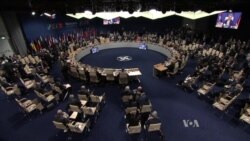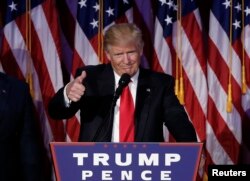When he takes office as U.S. president, Donald Trump will work shoulder to shoulder with leaders of NATO's top member states, who happen to be women, and observers are expecting some awkward moments.
During the presidential campaign, Trump was accused of having a disrespectful attitude toward women. The concern adds to questions of whether he will sustain the U.S. commitment to defend members of the world's most powerful alliance.
Trump stunned NATO and defense analysts when he told The New York Times during his campaign that the United States would defend NATO members against Russian aggression only if they paid their bills and made fair contributions to the alliance.
"Donald Trump and what he represents with respect to NATO, in particular, is dangerous," said Christine Cheng, a professor in the Department of War Studies at King's College London. "He is going straight at the heart of the alliance and even the idea of calling that into dispute, I think, terrifies a lot of [countries], particularly the eastern European countries."
Analysts like Cheng say it is not only his stance on NATO that gets the president-elect off to a shaky start with alliance members. Distasteful remarks about women revealed during the campaign could present challenges when dealing with influential leaders, who include British Prime Minister Theresa May and Germany Chancellor Angela Merkel.
"I think that Mrs. May and Mrs. Merkel will be extremely professional and cordial," Cheng said. "Having said that, it is difficult to imagine, as a woman, how one could overlook the things he has said and the things that he has done."
There is general agreement that Trump, May, and Merkel have one thing in common: They are all business when it matters.
"I think Mrs. Merkel, who in some ways I think is much more of a European than Theresa May is, I think she's going to regard Mr. Trump as a kind of United States phenomenon, in a way which just says this country, this extraordinarily rich and vital country, produces all kinds of ideas and people who are extraordinary in European terms," said Mary Evans, a professor at the London School of Economics' Gender Institute.
In congratulating Trump on his victory, Merkel, according to some observers, appeared to lay out a few conditions for her future interactions with him.
She said Germany and America are bound together by a long list of values that include respecting people's dignity regardless of gender.
"On the basis of these values," Merkel said, "I am offering to work closely with the future president of the United States, Donald Trump."



























